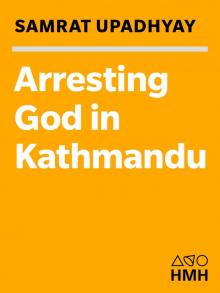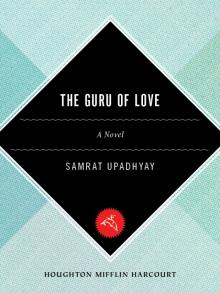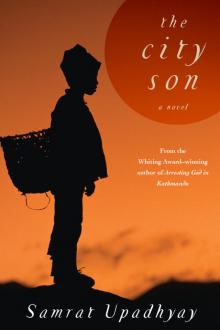- Home
- Samrat Upadhyay
The City Son
The City Son Read online
Copyright © 2014 by Samrat Upadhyay
All rights reserved.
This book is a work of fiction. References to real people, events, establishments, organizations, or locales are intended only to provide a sense of authenticity, and are used ficticiously. All other characters, and all incidents and dialogue, are drawn from the author’s imagination and are not to be construed as real.
Published by
Soho Press, Inc.
853 Broadway
New York, NY 10003
Library of Congress Cataloging-in-Publication Data
Upadhyay, Samrat.
The city son / Samrat Upadhyay.
p. cm
ISBN 978-1-61695-381-2
eISBN 978-1-61695-382-9
1. Young women—Nepal—Fiction. 2. Psychological fiction. I. Title.
PR9570.N43U63 2014 823′.92—dc23 2013045388
Interior design by Janine Agro, Soho Press, Inc.
v3.1
For Babita and Shahzadi
Contents
Cover
Title Page
Copyright
Dedication
Part 1
Chapter 1
Chapter 2
Chapter 3
Chapter 4
Chapter 5
Chapter 6
Chapter 7
Chapter 8
Chapter 9
Chapter 10
Chapter 11
Part 2
Chapter 12
Chapter 13
Chapter 14
Chapter 15
Chapter 16
Chapter 17
Chapter 18
Part 3
Chapter 19
Chapter 20
Chapter 21
Chapter 22
Chapter 23
Chapter 24
Part 4
Chapter 25
PART 1
CHAPTER ONE
A STRANGER COMES to the village and delivers the news.
Didi hears a woman’s voice in her yard. She’s upstairs, going through the boys’ old clothes, deciding which ones she wants to keep and which ones to pass down to a neighbor’s children. Her first thought when she hears the woman’s voice is that something has happened to her husband in the city. Then she knows it’s something else. She stands still, holding in her hands a pair of dark blue shorts, too tight for her older son, Amit. “Is anybody home?” the woman cries out again. Didi goes to the window.
“Are you the woman named Sulochana?”
Didi nods.
“I have to talk about an important matter.”
The woman identifies herself as belonging to the next village, then she makes some connections—throws out some names—that form a vague picture in Didi’s mind about who she is. A sickly feeling has started in Didi’s stomach. She doesn’t want to hear this woman. I should shut this window, she thinks, and I can go back to sorting my boys’ clothes. But there is no going back.
“Sometimes I feel like my heart is going to break,” the Masterji wrote in a letter not too long ago, “at the thought of not being able to come home again this year. My heart is going to shatter into pieces—that’s what I feel. But this separation is not for long, Sulochana. Next year I am sure to visit.” Didi had squinted at the words, mumbling them to herself for coherence; she had studied only up to seventh grade. At home he never called her by her name, but in all his letters he addressed her as “Sulochana.” In the evening when the boys had come home, she’d told them, “Next year. He can’t come this year—too many students. That’s what you get for having a brilliant father.” She’d formed her own picture of the name her husband had amassed in the city: people greeted him when he strolled the streets. Each dawn when the air was fresh and vibrant, he made rounds of the temples. His forehead smeared with tika, he returned to his neighborhood, drank tea in his favorite shop before going to the school where he taught in the morning session. He returned home around noon and soon thereafter received his first students, to whom he gave his private tutoring. Sons and daughters of high-ranking officials lined up at his door to seek his assistance.
“The other day, the prime minister’s wife came to see if I could tutor her nephew,” he’d written. “I told her that she ought to have sent someone to fetch me, but she said that she didn’t want to disturb me when I was hammering away and chiseling the shape of young minds. Hadn’t the king himself often said that the youth of today are the nation builders of tomorrow? She observed the four students I was tutoring at the moment, all of whom were staring at her slack jawed, and said that four nation builders were already in the making. Sulochana! The prime minister’s wife! What did I do to deserve this luck? Sometimes I feel that I don’t even deserve you and the boys. How patient you have been with me in this absence, this peeda of our long separation.”
Peeda: she loved the word he used for his torture. Peeda was what she felt, too, except she never expressed it.
The sickly feeling carries a smell that rises from her stomach to her mouth. It’s like the odor of an animal. The shorts she holds in her hands have a urine spot that has not completely washed away. What’s going to happen to my boys? she reflects. But it’s too late, and she knows it. She’s not at the start of this momentum; she’s already in the middle of it. The boys are going to suffer. Other people, unknown faces she hasn’t yet met, are going to suffer—people who are now suddenly connected to her.
“Are you going to invite me in?” the woman asks.
“Whatever you need to say, feel free to say from the yard.”
“The matter is a bit too delicate for the open air.”
“It’s okay.”
“Kasto kura nabujheko bhanya. It’s for your sake I’m urging privacy.”
“I perfectly understand. Either tell me right here or go your own way.”
The woman looks annoyed, but then she begins to speak. Her manner of speaking is singsongy, as if she were reciting a favorite ditty from her childhood.
The woman finishes speaking her main bit, pauses, then continues, “I wouldn’t have gone through the trouble of coming here and talking to you had I not been told that you have been kept in the dark about this for years now. How is that possible? I asked myself. How is it that a wife would not know about this big a secret her husband has kept in the city? What kind of wife would not know this? Then I had to see for myself what kind of wife. Now that I have seen you, I know you don’t deserve it. What woman does? You have given your life to your husband, haven’t you, Sulochanaji? And look at the news that I have brought you.
“I’ve seen the boy walk hand in hand with his mother in the market. The boy has immaculately smooth skin and perfectly dimpled cheeks and large, curious eyes. His mother is also exceptionally beautiful. Like an actress in a film, that kind of beauty. A city kind of beauty, sahariya type, the type one finds in magazines. Her face is longish and perfectly shaped. She is petite, loves to wear red. Apsara is her name. Yes, a nymph—that’s what her parents named her. She was a student of his. She came to his flat for tutoring so she could pass the SLC and college exams. Then one day she didn’t return home. Her parents disowned her; her brother came to thrash your husband. But she told everyone her place was with him in that sparse flat in the crumbling house in the busy intersection of the city’s core.
“When I saw her she was dressed in a shimmering red sari as though she had been wedded that very day. The whole street was glowing because of her. People stopped to look at her, then at her son. You know where this was? Right in the Asan market. Soon you’ll know what kind of place Asan is. It’s very close to Bangemudha, where your husband lives, near the large wooden lump studded with coins. People say nailing coins into that wood has a palliative function,
but I can’t remember what it cures. Stomachache? Toothache? This is the type of neighborhood where small bands of men with flowers in their hair and cymbals and drums pass through—amazing how only three or four men with their instruments make the sky throb. Not too long after the boy was born, your husband decided that the one-room flat wasn’t big enough, and now they’ve moved to a small house with a separate kitchen and an indoor bathroom. It’s not a bad place. The rent is more expensive than the previous flat, but then your husband is also getting more students to tutor now.
“In the Asan market that day, the boy’s mother was smiling at everyone. The boy was sucking on an ice cream. His beauty made my heart ache, Sulochanaji. I was told that the boy’s mother never wore anything other than bright red—bright red sari, bright red blouse with dhoti—as though it were the festival of Teej all year long. When she was pregnant with the boy, she put a big red tika on her forehead, I was told, and with her rouge and her red sindur smeared on the parting in her hair, she was like a radiant flame. There are these dental shops in Bhedasingh with their horrendous wares—hammers and wrenches and pliers and whatnots—near where your husband lives. When she passed by, those dentists came to the doors of their shops to admire her. They teased her, despite their wives looking from the windows above. ‘Sahuni,’ they said—they called her sahuni, even though she didn’t operate any shops—’where are you off to so early in the morning, wearing such nice clothes?’
“ ‘Ooo tyahi samma jana lageko. I have to buy a thing or two.’
“ ‘And you are leaving poor Masterji by himself?’
“ ‘He is tutoring his students.’
“The wives of these dentists also called out to her, ‘So, sahuni, when is the big guest coming?’ Apsara wasn’t showing at that time, but somehow the whole neighborhood guessed, correctly, that the boy was on his way. The eyes of these dental wives followed her as she moved on. They wondered about the Masterji’s family back in the village. They invited Apsara up for tea and sweets and plied her with questions. She feigned ignorance when the dental wives asked about the wife and sons in the village.”
Since she has been talking for so long, the messenger’s mouth is dry, and she holds on to the hope that Didi will offer her some water. But Didi has already left the window. It’s twilight. The woman thinks she should be on her way back. Drunks appear on the village pathways after dark; there have been cases of rape. Just as the woman is about to turn away from the house, Didi appears at the door.
CHAPTER TWO
DIDI IS HOLDING a cup of tea. She hands it to the woman.
“Shall we sit down for a while?” the woman says, moved by this unexpected gesture of kindness. “My legs are giving out on me.”
Didi leads her to the porch, where there’s a mat. Darkness is beginning to fall around them. The boys will soon return home from their play. Didi will have to cook rice. There are some leftover vegetables from this morning. There’s some milk—she keeps two cows in the shed in the back—and a neighbor has brought over some goat hooves, which she will boil to make broth for the boys.
“What are you going to do?” the woman asks.
“I’m going tomorrow.”
“What about the boys?”
“They’re going with me.”
“Will you tell them?”
“They’ll find out soon enough.”
Didi is looking into the dark, perhaps to listen to her sons’ voices. Someone walks by on the path with a torch and calls out her name. “Everything is well, bhauju?” It’s a man’s voice.
“Everything is well.”
“What is the Masterji’s news in the city?”
“Everything is well.”
The man bids her goodbye and moves on.
“I saw them with my own two eyes,” the woman says.
“Did you see him there, my husband, in that marketplace?”
“No, but I did some investigating. I went to Bangemudha, knocked on the door, pretended that I was a student seeking help. Me, a grown woman! But I said I was what they now call an adult learner, returning to education after a long time.”
“What does the new flat look like?”
“It’s right next to the street, just a stone’s throw away from where he used to live, where she came to him for tutoring, where the beautiful boy, Tarun, was born.”
“I want to see this boy,” Didi says.
“This flat is the whole house, one story. The owner is a local merchant.”
“Tell me about Asan, since this is the place where you saw the boy and his mother.”
“It’s the old part of the city, you know, so it has that charm of the olden, golden days.”
“I know nothing of the city. I’m just a village numskull. So please tell me everything.”
“There is a vegetable market which is rancorous and alive all day. Spice shops make you sneeze as you pass by. Oil men sit in their cubbies dripping in oil, and they have these long, thin ladles they use to scoop the oil and pour it into their customers’ containers. There’s the famous temple of Annapurna. You might want to pay her your respects before you go to your husband’s home. There’s also a spot in Asan where a fish fell from the sky a long time ago. You can still see its imprints, but that’s a long story.”
Just then the boys come home, fighting. The older, louder one is berating the younger one, who is whining. They stop when they see the silhouette of the woman.
“I should get moving,” the woman says.
“How will you make your way at night? You can leave early in the morning.”
The woman sleeps next to Didi. The boys, snoring loudly, sleep in the corner. Because it’s a new place, the woman keeps waking up every hour or so, and every time she senses that Didi hasn’t slept. Toward early morning, she asks Didi, “What are you thinking about?”
“I can’t stop thinking about that beautiful boy.”
CHAPTER THREE
“RAMRI CHHAINA,” a villager had warned the Masterji when his father finalized his marriage to Didi. “She has a regrettable face,” the Masterji overheard someone say. Yet every time the Masterji thought of approaching his father about what he’d heard, he lost his nerve. His father had suffered hardships so the Masterji could go to the city for his studies. His father had eaten only one meal a day; he had taken out loans.
Masterji’s father would have been happy to have him stay in the village, but his teachers had been encouraging him to opt for further studies in the city. “Don’t waste that fine brain of yours,” they said. Right after his School Leaving Certificate exams, in which he performed brilliantly, he had begun to teach at the school where he had studied. Although he enjoyed stimulating those young minds, he was slowly becoming restless. In the midst of imparting the day’s lesson he’d look out of the window and see his time passing by without any direction. The streams and paddy fields and woods where he had played now began to appear like a giant trap, the hills like a tomb closing in on him. Finally he went to his father, who said, “Of course, I support your decision and will make the necessary arrangements.”
“The city will be expensive.”
“That’s not your concern. You go there and study and become a big man and make us all proud. Just one thing, though.”
“Yes, Father?”
“Don’t forget your village. This is the place that gave you birth. You should never forget where you were born, the people around you when you were growing up.”
“Yes, Father.”
“Don’t get lost in the way of the city, Son.”
After four years of studying for his BA in Kathmandu, the Masterji came out at the top of his class. When his father called him home to get married, he returned, and now he was despondent at the news of his bride’s ugliness.
One morning the Masterji embarked upon a two-hour walk to his future bride’s village. He had her name and the name of her father, and after some inquiries he located her house. Given the two-story structure and an outer façade of nic
e-looking bricks, he knew that this was a family of decent wealth, something his father had already hinted at. The Masterji sat in a tea shop across from the house and watched it. For nearly an hour he watched, drawing questionable glances from the sahuni. Then his bride emerged with an empty gagri on her waist. She was going to fetch water. She was round, her face like a soccer ball. His heart dropped in disappointment. When she came closer, he saw her face. It was bhadda, flat and dark and uninteresting. Her cheeks were puffed up as though cotton had been stuffed inside. She had dark spots on her face. A neighbor of hers passed by, and his bride began talking with her.
The Masterji asked the sahuni, “Is that the girl of the house? Sulochana?”
“Yes, that’s her. Do you know her?”
“I’ve heard of her, that’s all.”
“If you like her,” the sahuni said, “it’s too late. She’s about to get married.”
“I see.”
“Are you surprised? Given how ugly and round she is?”
“I’m just here drinking tea.”
“They’ve been wanting to get her married for a while, but all the boys have balked. But now they’ve found some poor sod. A bright fellow in the city, I hear.” The sahuni laughed. “He has no idea what he’s getting into. I hear the boy’s father has taken some big loan from this girl’s family, and the marriage is an exchange.”
The Masterji sipped his tea.
“Would you want to spend day and night with that face?”
“She must have some virtues.”
“She’s a good girl, works hard, a good cook. A model wife. But that face! What does it remind you of?”
The Masterji shrugged.
“No, no, tell me. Does it remind you of something?”
The Masterji said nothing.
“A battered bhakundo, like the football our local boys kick and kick so hard on the field that it’s all blackened and bruised.”
The Masterji paid the sahuni and said, “You’re no beauty either,” as he left. As he walked past his bride, the Masterji noted that her lower right arm, not covered by her dhoti, resembled an elephant’s trunk.

 Arresting God in Kathmandu
Arresting God in Kathmandu Mad Country
Mad Country The Guru of Love
The Guru of Love The City Son
The City Son